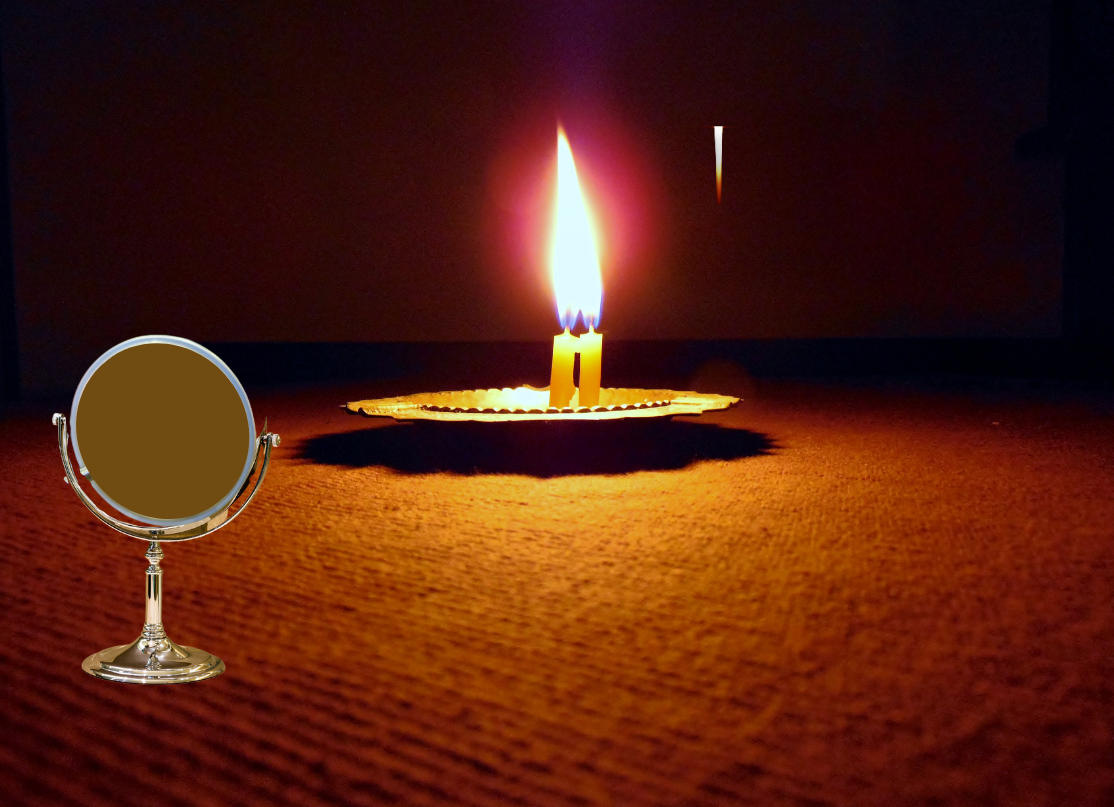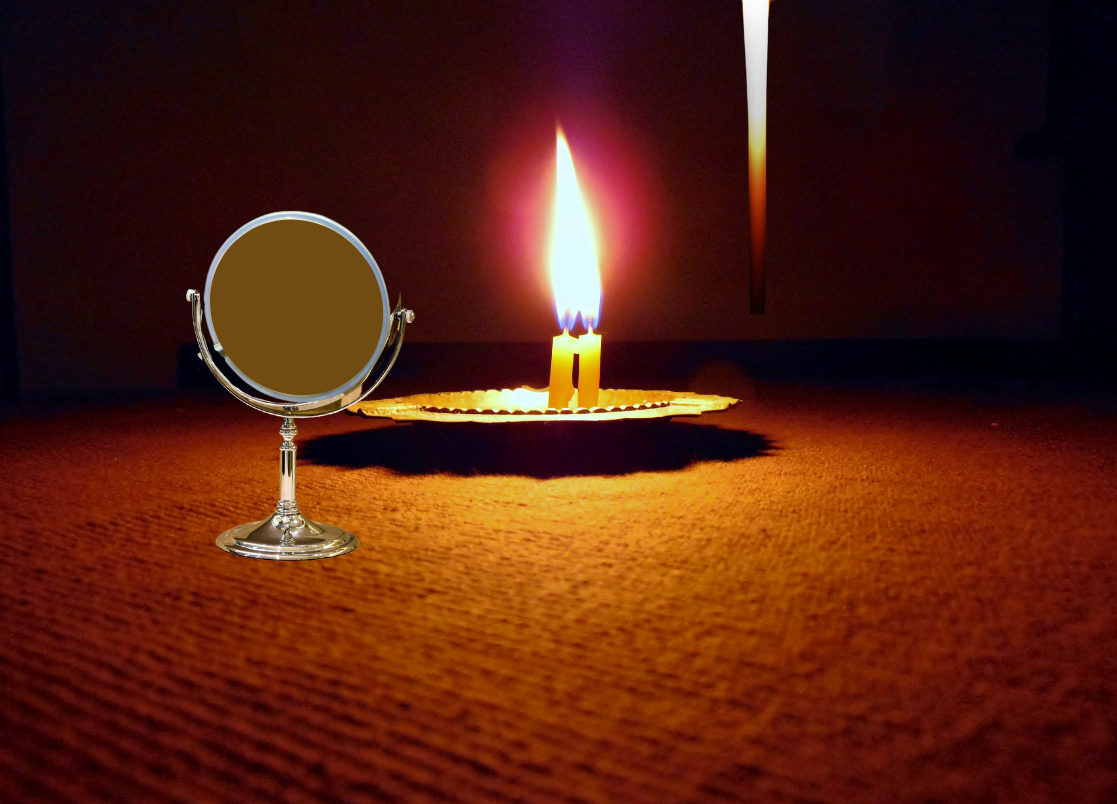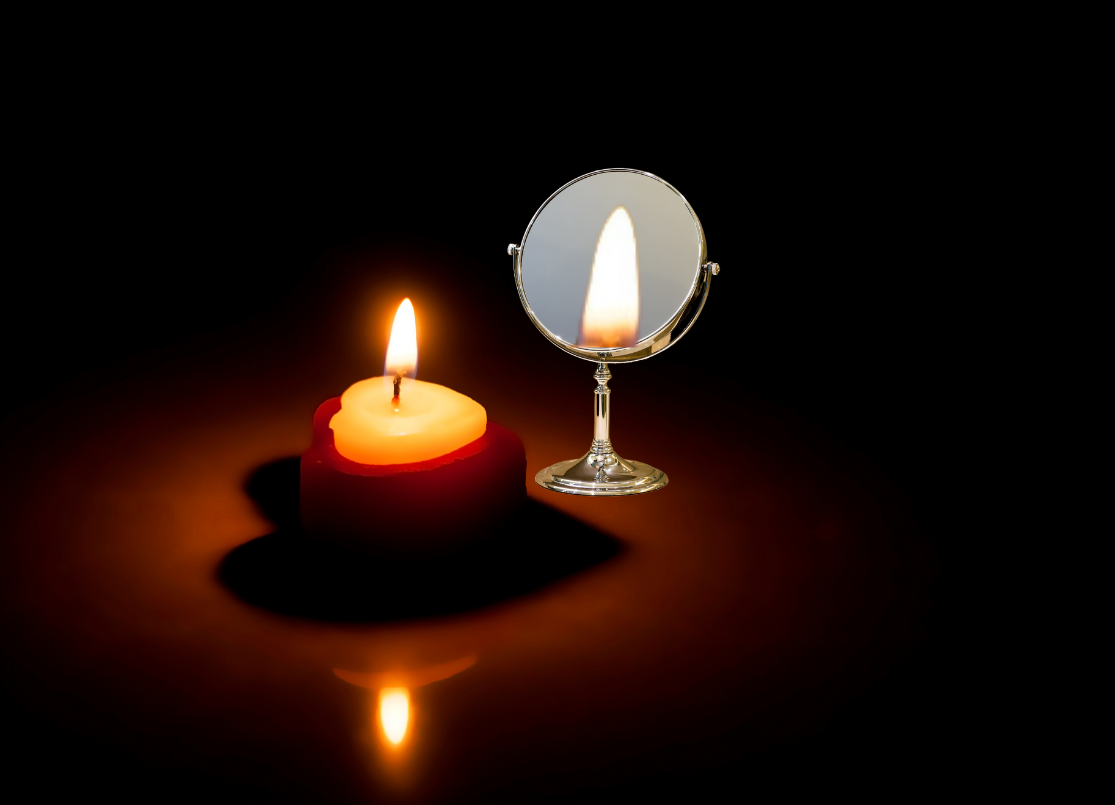7. Complete Activity 11.7 (Page 129). Fix a concave mirror on a stand (any arrangement to keep the mirror steady would do) and place it on a table. Paste a piece of white paper on a cardboard sheet (say about 15 cm × 10 cm). This will act as a screen. Keep a lighted candle on the table at a distance of about 50 cm from the mirror. Try to obtain the image of the flame on the screen. For this, move the screen till a sharp image of the flame is obtained. Make sure that, the screen does not obstruct the light from the candle falling on the mirror. Is this image real or virtual? Is it of the same size as the flame? Now move the candle towards the mirror and place it at different distances from it. In each case try to obtain the image on the screen. Record your observation in Table 11.1. Is it possible to obtain the image on the screen when the candle is too close to the mirror?
Answer: The activity can be carried out as follows:
Aim: To study the images of a candle formed by a concave mirror by positioning it at varying distances from the mirror.
Materials Required: Concave mirror, stand, white paper sheet, cardboard sheet (about 15 cm × 10 cm), lighted candle.
Procedure:
(i) Fix the concave mirror on a stand (any arrangement to keep the mirror steady would do) and place it on a table.
(ii) Make the screen bypasting the piece of white paper on the 15 cm × 10 cm cardboard sheet.
(iii) Keep the lighted candle on the table at a distance of about 50 cm from the mirror and try to obtain the image of the flame on the screen. If necessary, move the screen till a sharp image of the flame is obtained. The screen should not obstruct the light from the candle falling on the mirror. Observe the type of image that is formed on the screen.
(iv) Now move the candle towards the mirror and place it at distances of 40 cm, 30 cm, 20 cm, 10 cm and 5 cm from it. In each case try to obtain the image on the screen and record the details of each image in Table 11.1.
Observations: The details of the image of the flame for each distance are recorded in Table 11.1 below:
Table 11.1 Image formed by a concave mirror for object placed at different distances from it
| Distance of the object from the mirror | Smaller/larger than the object | Character of the image | |
| Inverted/Erect | Real/Virtual | ||
| 50 cm | Much smaller than object | Inverted | Real |
| 40 cm | Smaller than object | Inverted | Real |
| 30 cm | Smaller than object | Inverted | Real |
| 20 cm | Slightly smaller than object | Inverted | Real |
| 10 cm | Much larger than object | Inverted | Real |
| 5 cm | Larger than object | Erect | Virtual |
The image of the flame obtained for a distance of 50 cm is shown below:

The image of the flame obtained for a distance of 10 cm is shown below:

The image of the flame obtained for a distance of 5 cm is shown below:

Conclusions: We conclude that:
- When the object is too close to the concave mirror only an enlarged, erect and virtual image will form behind the mirror. No real image will form.
- As the distance between the object and the mirror increases, inverted real images are formed and the size of the image progressively decreases with increasing distance.
“Fix a concave mirror on a stand (any arrangement to keep the mirror steady would do) and place it on a table. Paste a piece of white paper on a cardboard sheet (say about 15 cm × 10 cm). This will act as a screen. Keep a lighted candle on the table at a distance of about 50 cm from the mirror. Try to obtain the image of the flame on the screen. For this, move the screen till a sharp image of the flame is obtained. Make sure that, the screen does not obstruct the light from the candle falling on the mirror. Is this image real or virtual? Is it of the same size as the flame? Now move the candle towards the mirror and place it at different distances from it. In each case try to obtain the image on the screen. Record your observation in Table 11.1. Is it possible to obtain the image on the screen when the candle is too close to the mirror?” – Solved.
Related Links:
Solution to Extended Learning Problem 1
Solution to Extended Learning Problem 2
Solution to Extended Learning Problem 3
Solution to Extended Learning Problem 4
Solution to Extended Learning Problem 5
Solution to Extended Learning Problem 6
Solution to Activity 11.1
Solution to Activity 11.2
Solution to Activity 11.3
Solution to Activity 11.4
Solution to Activity 11.5
Solution to Activity 11.6
Solution to Activity 11.7
Solution to Activity 11.8
Solution to Activity 11.9
Solution to Activity 11.10
Solution to Activity 11.11
Solution to Activity 11.12


